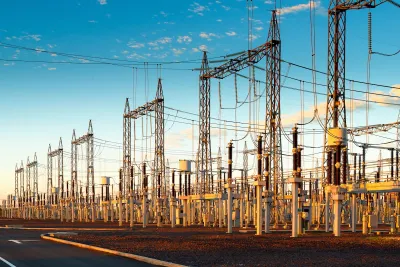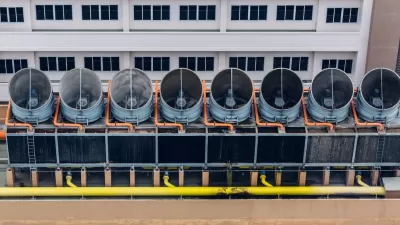Without regulatory changes, data centers’ high demand for energy would be subsidized by taxpayers, according to a new study.

A report from the Harvard Electricity Law Initiative warns that American energy consumers could subsidize the energy used by data centers by billions of dollars, reports Pam Radtke in Governing. “Data centers are forecast to account for up to 12% of all U.S. electricity demand by 2028. They currently use about 4% of all electricity.” According to one author of the report, because data centers use a disproportionately high amount of energy, “We’re all paying for the energy costs of the world’s wealthiest corporations.”
In many cases, utilities are still relying on fossil fuel-powered plants to provide the energy required by data centers. Meanwhile, the “perceived benefits” of data centers are failing to materialize. In Louisiana, “The potential costs aren’t just in bill increases, the paper points out. If utilities can profit from building new generation for data centers, they have no incentive to modernize their systems by switching to renewable or more efficient power, which would provide longer term benefits to customers and the climate.” In northeast Louisiana, a planned data center for Meta will be powered by a natural gas plant, sparking concerns about greenhouse gas emissions.
FULL STORY: Power for Data Centers Could Come at ‘Staggering’ Cost to Consumers

Alabama: Trump Terminates Settlements for Black Communities Harmed By Raw Sewage
Trump deemed the landmark civil rights agreement “illegal DEI and environmental justice policy.”

Planetizen Federal Action Tracker
A weekly monitor of how Trump’s orders and actions are impacting planners and planning in America.

Why Should We Subsidize Public Transportation?
Many public transit agencies face financial stress due to rising costs, declining fare revenue, and declining subsidies. Transit advocates must provide a strong business case for increasing public transit funding.

Understanding Road Diets
An explainer from Momentum highlights the advantages of reducing vehicle lanes in favor of more bike, transit, and pedestrian infrastructure.

New California Law Regulates Warehouse Pollution
A new law tightens building and emissions regulations for large distribution warehouses to mitigate air pollution and traffic in surrounding communities.

Phoenix Announces Opening Date for Light Rail Extension
The South Central extension will connect South Phoenix to downtown and other major hubs starting on June 7.
Urban Design for Planners 1: Software Tools
This six-course series explores essential urban design concepts using open source software and equips planners with the tools they need to participate fully in the urban design process.
Planning for Universal Design
Learn the tools for implementing Universal Design in planning regulations.
Caltrans
Smith Gee Studio
Institute for Housing and Urban Development Studies (IHS)
City of Grandview
Harvard GSD Executive Education
Toledo-Lucas County Plan Commissions
Salt Lake City
NYU Wagner Graduate School of Public Service





























